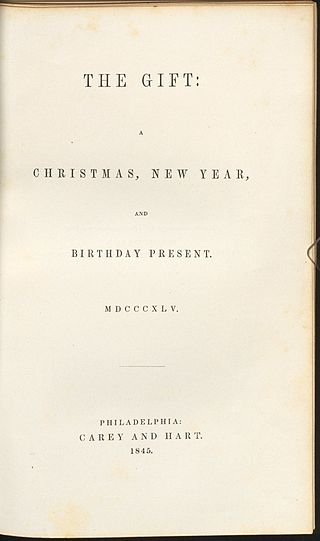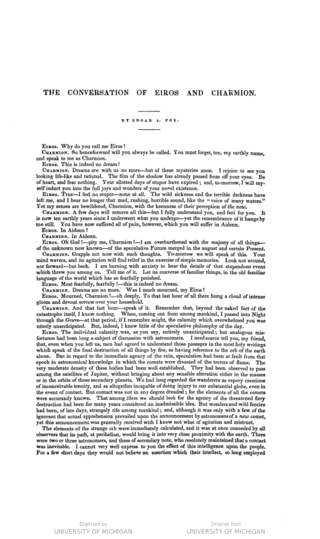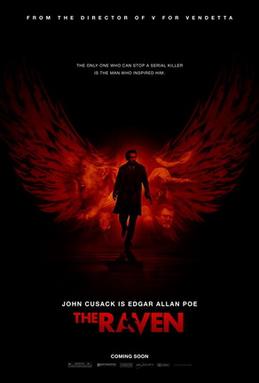
Edgar Allan Poe was an American writer, poet, author, editor, and literary critic who is best known for his poetry and short stories, particularly his tales of mystery and the macabre. He is widely regarded as a central figure of Romanticism and Gothic fiction in the United States, and of American literature. Poe was one of the country's earliest practitioners of the short story, and is considered the inventor of the detective fiction genre, as well as a significant contributor to the emerging genre of science fiction. He is the first well-known American writer to earn a living through writing alone, resulting in a financially difficult life and career.

"The Raven" is a narrative poem by American writer Edgar Allan Poe. First published in January 1845, the poem is often noted for its musicality, stylized language, and supernatural atmosphere. It tells of a distraught lover who is paid a mysterious visit by a talking raven. The lover, often identified as a student, is lamenting the loss of his love, Lenore. Sitting on a bust of Pallas, the raven seems to further antagonize the protagonist with its constant repetition of the word "Nevermore". The poem makes use of folk, mythological, religious, and classical references.

"The Purloined Letter" is a short story by American author Edgar Allan Poe. It is the third of his three detective stories featuring the fictional C. Auguste Dupin, the other two being "The Murders in the Rue Morgue" and "The Mystery of Marie Rogêt". These stories are considered to be important early forerunners of the modern detective story. It first appeared in the literary annual The Gift for 1845 (1844) and soon was reprinted in numerous journals and newspapers.

"The Tell-Tale Heart" is a short story by American writer Edgar Allan Poe, first published in 1843. It is told by an unnamed narrator who endeavors to convince the reader of the narrator's sanity while simultaneously describing a murder the narrator committed. The victim was an old man with a filmy pale blue "vulture-eye", as the narrator calls it. The narrator emphasizes the careful calculation of the murder, attempting the perfect crime, complete with dismembering the body in the bathtub and hiding it under the floorboards. Ultimately, the narrator's actions result in hearing a thumping sound, which the narrator interprets as the dead man's beating heart.

John Allen Astin is a retired American actor and director who has appeared in numerous stage, television and film roles, primarily in character roles. He is best known for starring in The Addams Family (1964–1966), as patriarch Gomez Addams, reprising the role in the television film Halloween with the New Addams Family (1977) and the animated series The Addams Family (1992–1993).

The Edgar Allan Poe Awards, popularly called the Edgars, are presented every year by the Mystery Writers of America, based in New York City. Named after American writer Edgar Allan Poe (1809–1849), a pioneer in the genre, the awards honor the best in mystery fiction, non-fiction, television, film, and theater published or produced in the previous year.
Poe is the mascot of the Baltimore Ravens of the National Football League (NFL). He is named after the writer and Baltimore, Maryland resident, Edgar Allan Poe.

"The Facts in the Case of M. Valdemar" is a short story by the American author Edgar Allan Poe about a mesmerist who puts a man in a suspended hypnotic state at the moment of death. An example of a tale of suspense and horror, it is also to a certain degree a hoax, as it was published without claiming to be fictional, and many at the time of publication (1845) took it to be a factual account. Poe admitted it to be a work of pure fiction in letters to his correspondents.

The Raven is a 1935 American horror film directed by Louis Friedlander and starring Boris Karloff and Béla Lugosi. Billed as having been "suggested by" Edgar Allan Poe's 1845 poem of the same title, excerpts of which are quoted at a few points in the film, it was adapted from an original screenplay by David Boehm. Lugosi stars as a neurosurgeon obsessed with Poe who has a torture chamber in his basement, and Karloff plays an escaped murderer on the run from the police who Lugosi manipulates into doing his dirty work.

"The Conversation of Eiros and Charmion" is a short story by Edgar Allan Poe, an apocalyptic science fiction story first published in Burton's Gentleman's Magazine in December 1839.

Edgar Allan Poe's poem "The Raven" has been frequently referenced and parodied in contemporary culture. Immediately popular after the poem's publication in 1845, it quickly became a cultural phenomenon. Some consider it the best poem ever written. As such, modern references to the poem continue to appear in popular culture.
"The Spectacles" is a short story by Edgar Allan Poe, published in 1844. It is one of Poe's comedy tales.

Politian (1835) is the only play known to have been written by Edgar Allan Poe, composed in 1835, but never completed.

American poet and short story writer Edgar Allan Poe has had significant influence in television and film. Many are adaptations of Poe's work, others merely reference it.

Edgar Allan Poe has appeared in popular culture as a character in books, comics, film, and other media. Besides his works, the legend of Poe himself has fascinated people for generations. His appearances in popular culture often envision him as a sort of "mad genius" or "tormented artist", exploiting his personal struggles. Many depictions of Poe interweave elements of his life with his works, in part due to Poe's frequent use of first-person narrators, suggesting an erroneous assumption that Poe and his characters are identical.

The Raven is a stylized silent 1915 American biographical film of Edgar Allan Poe starring Henry B. Walthall as Poe. The film was written and directed by Charles Brabin from a 1904 play and 1909 novel by George C. Hazelton.
Nevermore: The Imaginary Life and Mysterious Death of Edgar Allan Poe is a musical that was written, composed, and directed by Jonathan Christenson and designed by Bretta Gerecke. It follows the life of Edgar Allan Poe and the internal and external struggles he faced which are depicted as inspiring his writings. In the play, Poe struggles with tragedies such as death, abandonment, addiction, poverty, and loss. The script contains many references to Poe's poems and short stories. The script fictionalizes true events that took place in his life while also incorporating his creative works and poems. It was originally produced at the Catalyst Theater in Edmonton, Alberta, for an 11-week production that then went on to be performed at theater festivals, theaters across Canada, to the Barbican Theater in London, and the New Victory Theater in New York City.

The Raven is a 2012 American crime thriller film directed by James McTeigue, produced by Marc D. Evans, Trevor Macy and Aaron Ryder and written by Ben Livingston and Hannah Shakespeare. Set in 1849, it is a fictionalized account detailing the last days of Edgar Allan Poe's life, in which the poet and author helps the police pursue a serial killer, whose murders mirror those in his stories. While the plot of the film is fictional, the writers based it on some accounts of real situations surrounding Edgar Allan Poe's mysterious death. Poe is said to have repeatedly called out the name "Reynolds" on the night before his death, though it is unclear to whom he was referring. The film stars John Cusack, Alice Eve, Brendan Gleeson and Luke Evans. Its title derives from Poe's 1845 poem "The Raven", in a similar manner to the earlier unrelated 1935 and 1963 films.

The Fall of the House of Usher is an American gothic horror drama television miniseries created by Mike Flanagan. All eight episodes were released on Netflix on October 12, 2023, each directed by either Flanagan or Michael Fimognari, with the latter also acting as cinematographer for the entire series.

Rosalie Mackenzie Poe was an American poet and the sister of Edgar Allan Poe.














